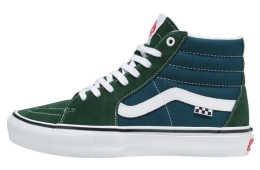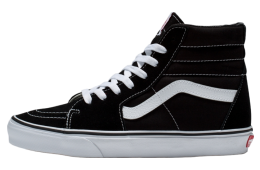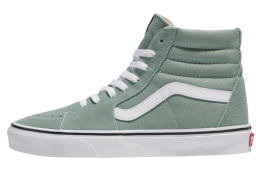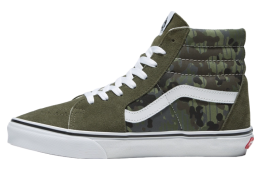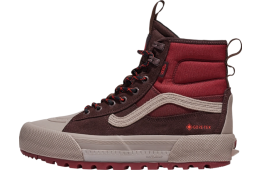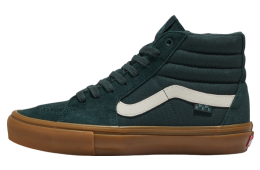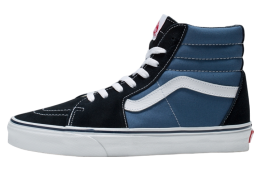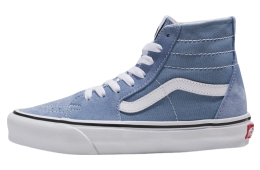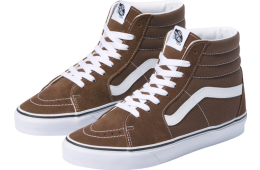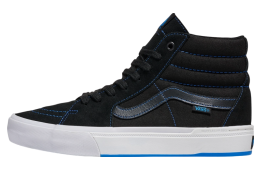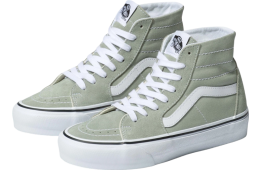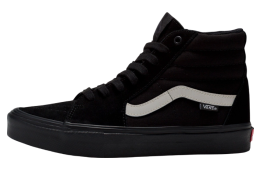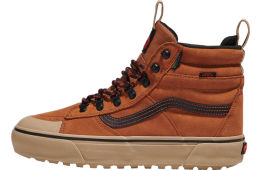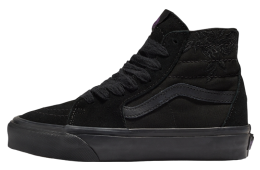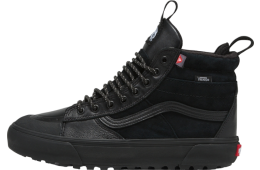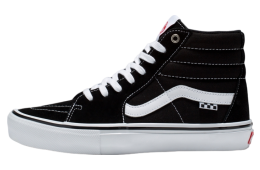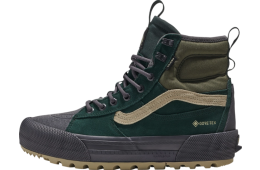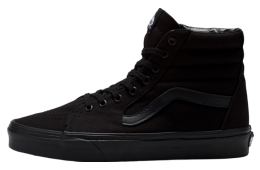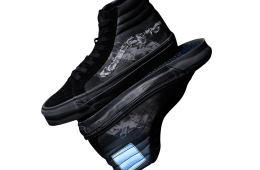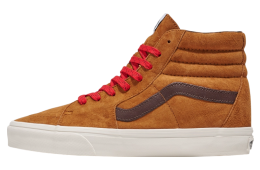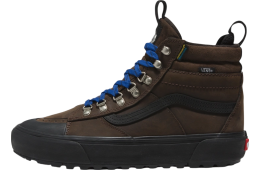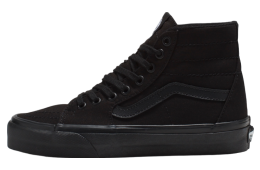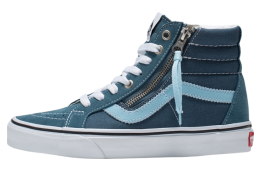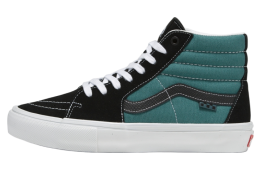Vans Sk8-Hi
Vans Sk8-Hi
The Vans Sk8-Hi is an iconic high-top sneaker that has left an indelible mark on both skate culture and fashion since its introduction in 1978. Originally designed as a performance shoe for skateboarders, the Sk8-Hi quickly gained popularity for its combination of durability and style. The shoe features a padded collar for ankle support and reinforced toe caps to withstand repeated wear, making it a favorite among skaters who needed footwear that could endure the rigors of their sport. Its distinctive side stripe, or "jazz stripe," and the durable waffle outsole have become trademarks of the brand, instantly recognizable by enthusiasts and the general public alike.
Beyond the skate parks, the Vans Sk8-Hi has also made a significant impact on streetwear and casual fashion. Its versatile design, available in a myriad of colorways and materials, has attracted a broad audience that ranges from musicians to fashion influencers. Over the years, various collaborations with designers, artists, and other brands have kept the Sk8-Hi fresh and relevant, appealing to new generations of fans. Whether paired with jeans, shorts, or even dresses, the sneaker seamlessly blends functionality with aesthetics, solidifying its place as a timeless piece in the world of footwear.
History of Vans Sk8-Hi
The Vans Sk8-Hi stands as an enduring icon in the landscape of skateboarding and streetwear culture, reflecting the journey of a shoe company that has propelled itself into the annals of American fashion history. To understand the significance of the Vans Sk8-Hi, we must traverse the evolution of Vans itself, the socioeconomic landscape of Southern California, and the cultural revolutions that characterized the late 20th and early 21st centuries.
The Beginning: Vans and the Birth of Skate Culture
Vans was founded on March 16, 1966, by brothers Paul Van Doren and Jim Van Doren, along with partners Gordon Lee and Serge Delia. Opening their first store at 704 East Broadway in Anaheim, California, the Van Doren Rubber Company was distinctive in its direct-to-consumer model. Vans offered durable shoes that were made on-site and sold directly to the public on the same day. This unique selling proposition garnered a local following and set the stage for the company's future success.
The Southern California of the 1960s and 1970s was a petri dish for the emerging skateboarding culture. The region's expansive concrete landscapes, extensive suburban development, and a favorable climate created a perfect playground for skateboarders. As the sport began to take root, skateboarders sought footwear that could withstand the high demands of skateboarding—abrasions, impacts, and constant wear and tear.
Enter the Vans Authentic, initially known simply as #44. While it was not intended specifically for skateboarding, its durable construction and sticky sole made it a hit with skaters. The immediate success of the Authentic provided vital feedback for Vans to pursue more skate-centric designs.
The Era of the Sk8-Hi: A Revolutionary Design
In 1978, Vans introduced the Sk8-Hi (originally known as Style 38), which would become one of the most significant releases in the company's history. This shoe was designed to address the limitations of low-cut sneakers in skateboarding. The Sk8-Hi featured a higher collar to offer better ankle protection—a necessity for skaters performing aerial tricks and high-impact maneuvers.
The shoe also incorporated padded collars for added comfort and protection and was constructed with a reinforced toe-box to endure the rigorous demands of skateboarding. The Vans Sk8-Hi quickly became a favorite among skateboarders for its durability, functionality, and distinctive look.
The "jazz stripe," an iconic curved line adorning the sides of Vans shoes, was first introduced on the Vans Old Skool and carried over to the Sk8-Hi. This simple yet bold design feature helped differentiate Vans from other brands and became a universally recognizable emblem of skate culture.
Cultural Ascendancy: From Subculture to Mainstream
Throughout the 1980s and 1990s, the Sk8-Hi played a pivotal role in Vans' ascension from a niche skate brand to a cultural phenomenon. As skateboarding's popularity surged, it carried with it the broader elements of counterculture, including punk rock, graffiti, and streetwear. Vans shoes were not merely functional items but statements of identity and rebellion.
Music also played a crucial role in propelling Vans into the mainstream. Many punk and hardcore bands—including the likes of Black Flag, the Sex Pistols, and Suicidal Tendencies—wore Vans on stage, reinforcing the association between the brand and youthful defiance.
As skateboarding culture permeated broader society, various media channels began to feature the Sk8-Hi prominently. For instance, the shoe found its way into movies, television shows, and music videos, further embedding it into popular culture's collective consciousness. A notable example is its appearance in films like "Fast Times at Ridgemont High" (1982) and "Back to the Future" (1985), which further solidified its place in the pantheon of iconic footwear.
The Revival: Sk8-Hi in the 2000s and Beyond
By the early 2000s, Vans had solidified its reputation as a powerhouse in both the skate and fashion industries. However, the landscape of streetwear began to shift, with the rise of sneaker culture and the convergence of sportswear, high fashion, and music. Into this evolving landscape, the Sk8-Hi found renewed interest.
The Sk8-Hi's resilience and classic style made it a ripe subject for collaborations with various brands, designers, and cultural icons. Over the years, Vans has partnered with a diverse array of collaborators, including fashion houses like Supreme, Off-White, and Fear of God, as well as artists like Tyler, The Creator, and Takashi Murakami. These collaborations breathed new life into the Sk8-Hi, often blending the shoe's classic elements with contemporary aesthetics.
Skateboarding's incorporation into the 2020 Tokyo Olympics served as a watershed moment for the sport and its associated culture. Vans' heritage and ongoing relevance in skateboarding meant the brand was poised to reap the benefits of the sport's elevated profile. The Sk8-Hi continued to signify a connection to the roots of skateboarding culture while appealing to new generations of fans.
The Anatomy of the Sk8-Hi
Understanding the anatomy of the Sk8-Hi underscores why it remains so beloved. The shoe features several key components that have remained largely consistent since its original release:
1. **High-Top Design:** This provides crucial ankle support and protection, making it an ideal choice for skateboarders. 2. **Waffle Outsole:** The iconic gum rubber waffle outsole offers excellent grip and board feel, attributes that are essential for skateboarding.
3. **Durable Canvas and Suede Construction:** This combination provides a balance of durability and flexibility. The reinforced toe caps ensure that the shoes can withstand repeated wear and tear.
4. **Padded Ankle Collar:** Added padding around the collar improves comfort and support, which is particularly beneficial during high-impact tricks.
5. **Side Stripe ("Jazz Stripe"):** This iconic design element is both a stylistic signature and a functional reinforcement for the shoe's sides.
Impact on Fashion and Popular Culture
The Vans Sk8-Hi, like many timeless designs, transcends its original purpose. While its roots are deeply entrenched in skateboarding, its impact on fashion and popular culture is equally significant. The shoe's minimalist yet distinctive design offers a versatile canvas for personal expression, appealing to a wide range of tastes and styles.
Skateboarding and streetwear have become significant influences in the broader fashion world. High fashion designers often draw inspiration from skate culture, incorporating elements of its aesthetic into luxury styles. The Sk8-Hi, with its clean lines and functional design, seamlessly bridges the gap between utilitarian footwear and high fashion. It is not uncommon to see Sk8-His paired with everything from jeans and a t-shirt to designer dresses on fashion runways.
In addition to fashion, the Sk8-Hi has left an indelible mark on music and entertainment. The shoe's connection to punk rock and hardcore in the 1980s has expanded to various genres, including hip-hop, indie rock, and electronic music. Musicians and artists from diverse backgrounds have embraced the Sk8-Hi, making it a fixture in concerts, music videos, and album covers.
Sustainability and Future Directions
As the fashion industry faces increasing scrutiny over its environmental impact, Vans has made strides to become more sustainable. The company has announced various initiatives to reduce its environmental footprint, including the use of eco-friendly materials and more sustainable production practices. These efforts are part of a broader industry trend towards greater sustainability and accountability.
The Sk8-Hi, like other Vans models, is subject to these sustainability initiatives. Future iterations of the shoe may incorporate recycled materials, improved production techniques, and other innovations to reduce its environmental impact. These efforts not only address environmental concerns but also resonate with a new generation of consumers who prioritize sustainability.
Conclusion: The Enduring Legacy of the Vans Sk8-Hi
The Vans Sk8-Hi is more than just a shoe; it is a symbol of a cultural movement that has influenced generations. From its origins in the skate parks of Southern California to its place on the feet of fashion icons, the Sk8-Hi exemplifies the intersection of functionality, style, and cultural resonance. Its enduring popularity is a testament to its timeless design and the profound impact it has had on skateboarding and beyond.
As Vans continues to evolve and innovate, the Sk8-Hi remains a cornerstone of the brand's identity. It serves as a reminder of Vans' commitment to supporting the skateboarding community and its ability to adapt to changing cultural landscapes. The Sk8-Hi's journey is far from over, and its legacy will undoubtedly continue to shape the worlds of fashion, music, and youth culture for years to come.
